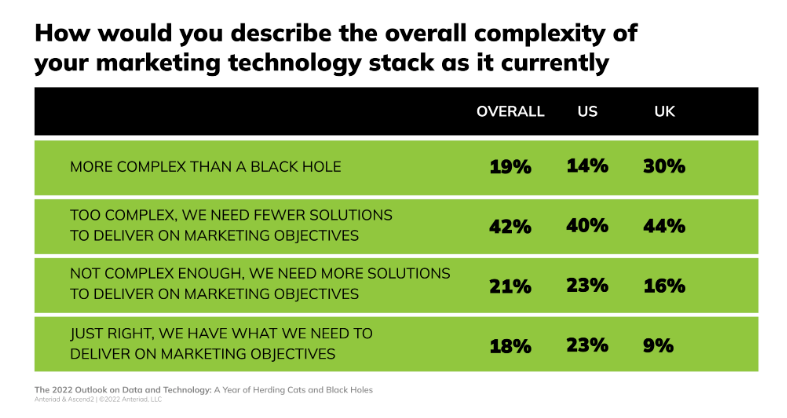AI Super App, Facebook Is MySpace, B2B Tech Stack Complexity

AI Assistant Super App
If the Twitter deal happens, Elon Musk suggested he wants to turn it into an "everything app" or "super app" à la WeChat. That's a bold strategy, though unlikely to succeed in North America. Uber and PayPal have similar aspirations. And while there may be a chance to build a vertical "super app," nothing like WeChat will probably happen. One intriguing possibility is Siri's still-unrealized vision of the AI assistant. Before Siri was acquired by Apple in 2010, its objective was to supersede the mobile search experience by delivering actionable results rather than a SERP. Siri's early promise (and later Viv, founded by the same people) was that a voice-assistant could get users to specific results/actions without the need for a SERPs or even apps. Consumer voice search/assistant usage has stalled. However, AI capabilities continue to advance. A next-gen virtual assistant (e.g., Augment) could sit on top of web and app content and perform a range of functions for users, effectively becoming a "super app."

Our take:
- Apple could still attempt a version of this if it had the vision/chutzpah/cojones.
- The chances of getting anyone to fund a "boil the ocean" vision like this are small, given perceptions of Google's invulnerability.
- AI will produce new consumer experiences. They might get us closer to the true potential of "virtual assistants."
Is Facebook Entering MySpace Territory?
The history of social networking goes something like this: Hot or Not (2000), Friendster (2002), MySpace (2003), Facebook (2004) and so on. (LinkedIn launched in 2003 in a kind of B2B parallel universe.) MySpace, then the dominant social network, was acquired in 2005 by News Corp for ~$600M. It peaked in 2008 and was surpassed by Facebook in 2009. MySpace rose meteorically and flamed out almost as fast, though a zombie brand lived on for years. There are numerous MySpace postmortems. Facebook is very different in many ways and has survived and largely thrived for 18 years. But growth has plateaued and the site has been shunned by Gen Z. It still has a massive audience and is a huge cash cow. But Facebook is busy trying to turn itself (and Instagram) into TikTok, which won't work. It's also unlikely Meta's metaverse vision will succeed globally. The question now is: how long Facebook's decline will be? It could be years.

Our take:
- Instagram and WhatsApp can still tell a growth story. WhatsApp in particular is very interesting from an SMB/local perspective.
- Influenced by TikTok, social media is changing, as the social graph weakens and gives way to the interest graph.
- The market is fragmenting, which helps Facebook legally, but makes it tougher (along with privacy) for marketers to reach audiences.
B2B Tech Stacks Too Complex
There are nearly 10,000 B2B "martech solutions" in the market. That's up from roughly 150 in 2011. Many of those SaaS tools have become essential but their proliferation has created confusion and complexity. And those that have been adopted are often underutilized. According to a recent Gartner survey (nu=324 marketers), "marketers report utilizing just 42% [ ] of capabilities available in their martech stack overall, down from 58% in 2020." Beyond this, a 2022 B2B marketer survey (n=370 US, UK) conducted by Ascend2 found that 61% believe their tech stacks too complex to deliver the promised value. In the UK that number is 74%. Top martech solutions in use are 1) CRM, 2) CMS, 3) marketing automation, 4) CDP, 5) marketing database, 6) DMP. The main complaints were: 1) data isn't normalized, 2) tools don't talk to each other, 3) unnecessary features. Marketers want simplicity and comprehensiveness.

Our take:
- The complaints above are common and reflected in multiple surveys.
- Part of the problem appears to be that a majority of marketers (66%) don't have a comprehensive data strategy in place.
- AI offers hope to simplify and more effectively utilize data. Yet data availability is declining because of privacy. AI can help there too.
Recent Analysis
- Near Memo 84, special edition: Near.St's Nick Brackenbury talks about the rise of local inventory data and Google's product search strategy.
Short Takes
- Behold: the BrightonSEO slides (Lino Uruñuela via Aleyda Solis).
- 71% of private employer jobs in Sept. were at <500 headcount firms.
- New (SMB) business formations roughly 2X pre-pandemic.
- DoorDash in cynical deal with Marvel to glamorize delivery jobs.
- Google RSAs automated creation of headers and descriptions in beta.
- Will TikTok co-opt BeReal or help it go mainstream?
- Los Angeles has more surveillance per capita than any other US city.
- Well intentioned CA privacy law could generate invasive enforcement.
- iPhone to get USB-C charger, in transition to wireless charging.
- Is Peleton, darling of the pandemic, entering a death spiral?
- "Old and outdated," the GIF may be dying.
- If Gen Z has its way email will go the way of the landline (NYT).
- It's not yet Halloween and holiday shopping is already under way.
- Dance Diffusion: AI-generated music is coming.
Listen to our latest podcast.

How can we make this better? Email us with suggestions and recommendations.

